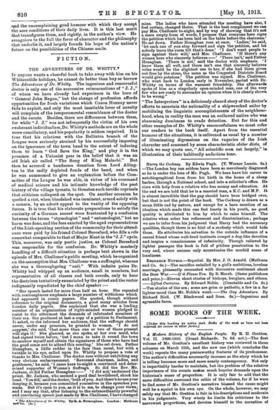Harry the Cockney. By Edwin Pugh. (T. Werner Laurie. 6s.)
—The London boy can seldom have been so mercilessly diagnosed as he is under the lens of Mr. Pugh. Wo here have his career in autobiographical form from his birth in the home of a cheap barber, through a National school, and into a solicitor's office. He rises with help from a relative who has money and education. At the end we are told that he is a married man, a K.C. and M.P. It is almost incredible that the gap should have Leon bridged over, but that is not the point of the book. The Cockney is drawn as a mean little cad by nature, and except for a bare mention of an idealism which made this one feel lonely in his youth, no good quality is attributed to him by which to raise himself. The relative when sober has refinement and discrimination ; perhaps we are to infer from his judgment that Harry had the necessary qualities, though there is no hint of a modesty which would hide them. He attributes his salvation to the outside influence of a casual friend whose well-bred instincts compel a dog-like devotion and inspire a consciousness of inferiority. Though relieved by lighter passages the book is full of pitiless penetration to the very end, where success only accentuates the morbid sense of loneliness.










































 Previous page
Previous page